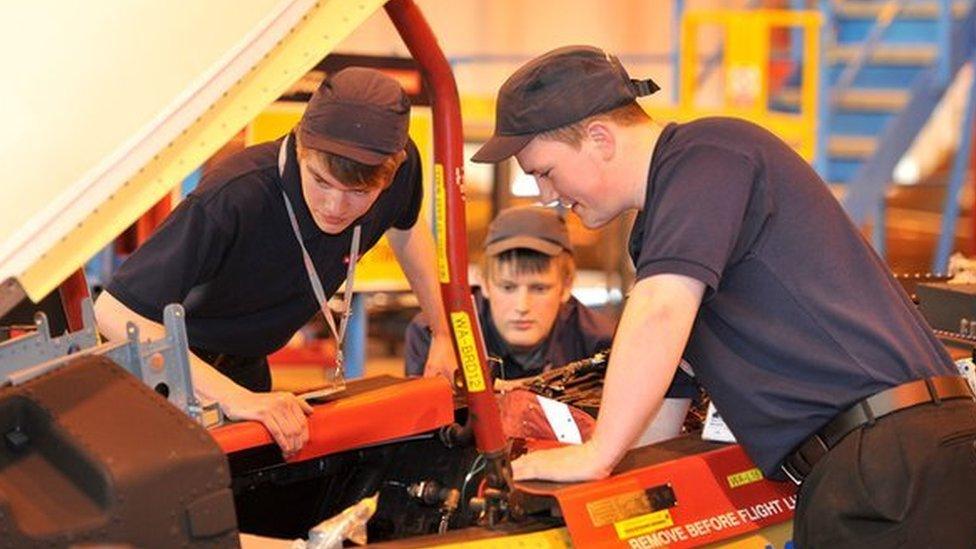Apprenticeship v university: What course to take?
- Published
- comments

Remember that moment when the school careers adviser leant over the desk and asked: "So what are you planning to do next?"
It's a daunting decision when you're 17.
A university degree costs tens of thousands of pounds, although the evidence suggests it can boost your earning potential later.
On the other hand, an apprenticeship lets you earn as you learn, but life gets serious pretty fast.
Apprenticeships are shaking off a reputation for low-paid drudgery and there are more higher-level apprenticeships coming on stream. But competition for the best opportunities is as fierce as it is for the top university places.
So if you're leaving school, does it make sense to aim for one of those coveted places? Or are you missing out if you don't go for the campus experience? Recent apprentices and graduates have shared their experiences with us.

'School was very anti-apprenticeship'
When Matt Carpenter left school at 17, a lot of his classmates were aiming for university. He could have joined them.
"I was the only person in my class who didn't go," he says.

At 21 Matt Carpenter (r) is already qualified to drive ships and tankers
Instead, he took up a three-year apprenticeship with the Merchant Navy, spending half his time at college and half his time at sea on oil and gas tankers, passenger ships and bulk carriers.
"School was very, very anti-apprenticeship - even when I had the place, they were very against it. Up until the last day, they were still asking, 'Do you really want to do this?'"
For him, the choice was clear: no student debt and pay of £175 a week. Now, at 21, he's on an annual salary of £37,000 tax-free and qualified to drive the world's largest ships.
He admits the social life didn't compare to what his friends were up to, though. "When you're at sea, you're quite cut off. There's no internet. You're working every day."

'It made me who I am'
Amy De Friend, 25, did a degree in fashion promotion and communication. She now works in recruitment, but doesn't regret her decision to study first.
"I went to university, because at the time I didn't know what I wanted to do." Amy started her degree the first year that fees went up from £3,000 a year to £9,250.
"My parents said: 'Do you really want to spend £9,000 on this?'"
And at the end of the three years, she discovered that to get into the fashion industry, she would still have to take unpaid internships. So she worked for Carphone Warehouse instead.

Amy De Friend says one of the new experiences she gained through university was learning to scuba dive
Amy accepts she could probably have got the recruitment job she's in now without a degree.
"I wouldn't say it was a waste of time," she says. "The experience I had was fantastic, it helped me develop as a person."
At university, Amy joined a diving club and qualified as an instructor, something she wouldn't otherwise have tried.
"I don't think it's all about getting a job. It's about what you gain from the experience. It made me who I am."

'I was itching to start work'
Nick Martin, 20, has just been head-hunted for a £22,500-a-year job in sales. He puts that down to his work experience as an apprentice with a telephone networking equipment company.
"Before I got my last job, I went through a lot of interviews. Every single agency and company loved the fact I had done an apprenticeship, because it shows you know what it's like in a fast-paced office environment."
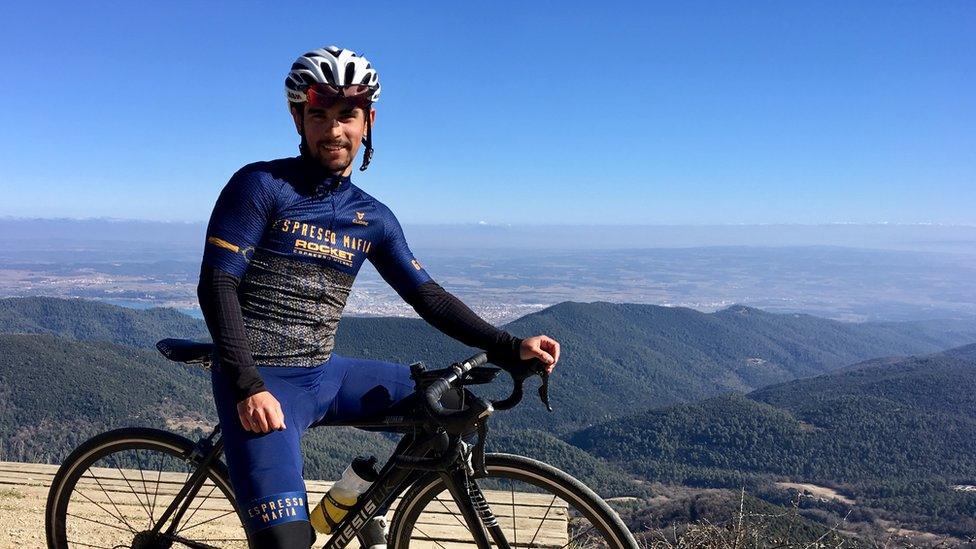
Nick decided he could pursue his ambitions as a semi-pro cyclist alongside an apprenticeship just as easily as through a university team
At 17, Nick was "just itching to get into work".
The apprenticeship scheme he joined was new and he felt he was a "guinea pig", often left to get on with things unsupervised, which meant a lot of responsibility very quickly.
"By the time most people my age come out of uni, I'll have had three to five years' experience. On the flipside, I haven't spent that time getting the extra qualifications."
"At the time, I didn't have doubts. Now, to be honest, I think about it a bit more. The main reason for that is a bit of 'Fomo' - fear of missing out - missing out on the social aspect of being at uni. You get to live in halls or housing with flatmates. I'm still living at home."
Then there's the snobbery. "I still get that feeling from some people - people I know who are at uni who think they're better - there can be a smugness. But there's nothing guaranteed. They'll have a degree, but they'll still have to find a job, which is hard."

'To learn about something I loved was brilliant'
Jenny Willbourn, 29, joined engineering firm Atkins after gaining undergraduate and post-graduate degrees in geography. The firm has a well-established apprenticeship programme, but she says that wouldn't have been the right route for her.
"I believe there's something valuable in academic study - the opportunity to understand a particular area of knowledge."
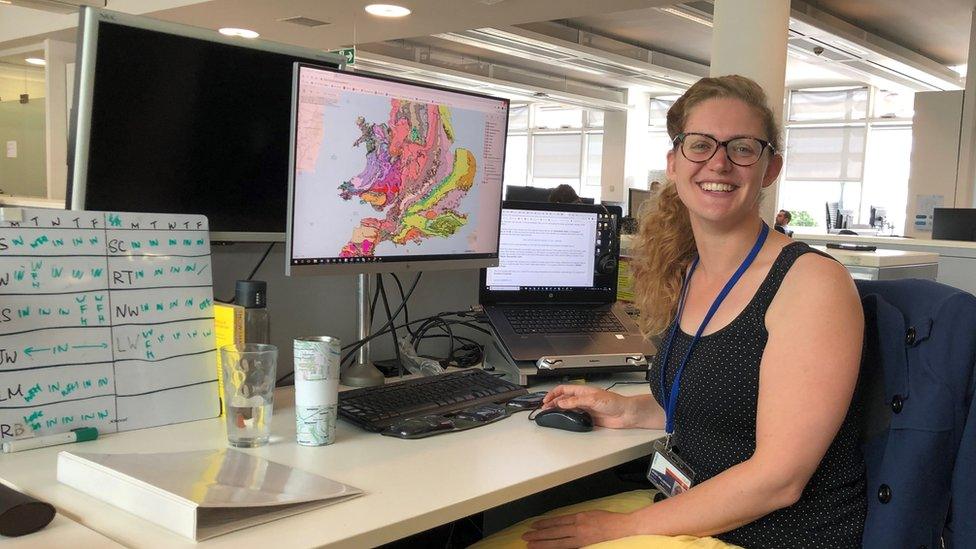
Jenny Willbourn joined Atkins after studying for five years at university
"To push your communication skills is one thing, but to critically evaluate - that's a skill that university teaches. I value that as second to none."
She works in a highly specialised team at Atkins looking at spatial data, including mapping the locations of badgers and bats as part of the HS2 planning process.
"I needed a degree to tell me what the options were and give me the skills I now have. For me, the ability to hone my skills at an academic level was very important."
But above all, she enjoyed the experience: "To learn about something I loved was brilliant."

'I feel really proud of myself'
Joy Shepheard-Walwyn, 19, had a place at Durham University to study philosophy and Russian. She rejected it in favour of a management consultancy apprenticeship with accountancy firm PwC.
Moving to Leeds on her own just a few days after her 18th birthday was nerve-racking, she says. But PwC has helped provide a community for her in and out of work. She's joined the firm's netball team and teaches English to refugees. She loves the work, managing change in the public sector, adult social care, local government and schools.
"I feel really proud of myself in terms of what I've achieved."
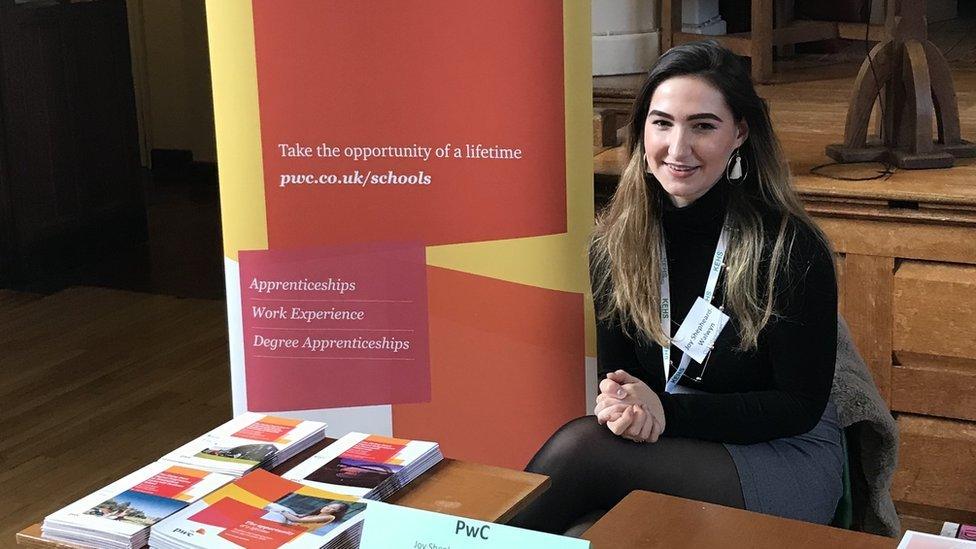
Joy Shepheard-Walwyn turned down a university place to take up a PwC apprenticeship
She thinks university can be about putting off adult life a little longer. "My friends are out partying a lot, but I'm earning a salary."
"I don't feel I missed out. I just went it about it a different way."
- Published22 October 2018

- Published26 June 2019
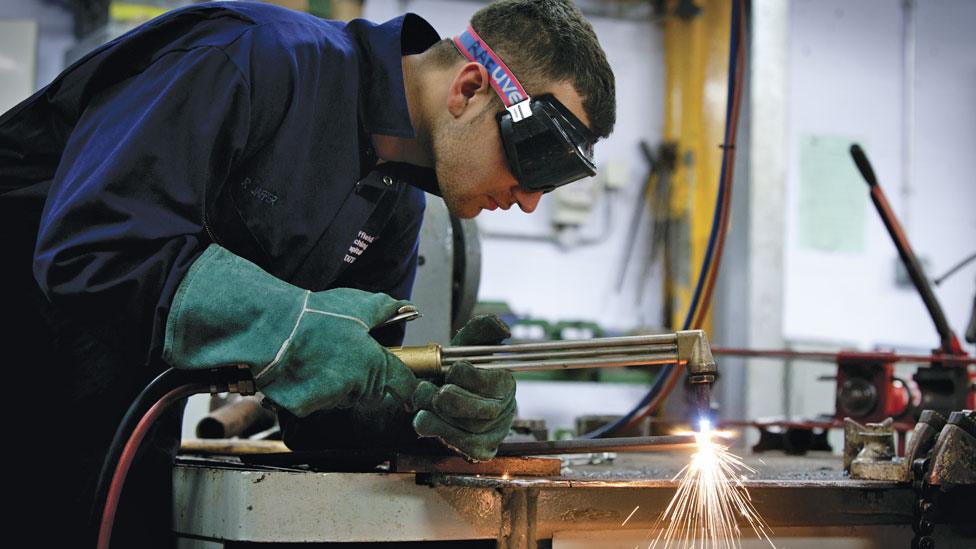
- Published6 March 2019
